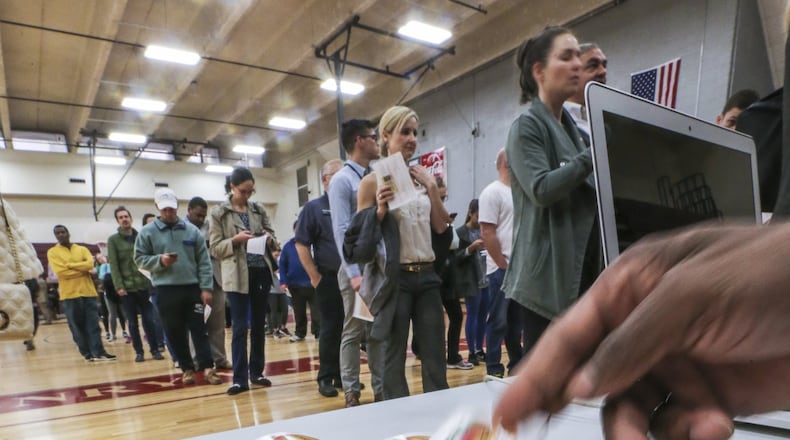Forced by the coronavirus to resort to virtual campaigning, some Georgia candidates hit the trail in-person for the first time in months, venturing to protests and parks to plead with voters to rush the polls on Tuesday.
Democratic candidates competing to challenge U.S. Sen. David Perdue joined marches and demonstrations against policy brutality and racial injustice, as did down-ticket contenders who expressed solidarity with demonstrators who called for sweeping criminal justice changes.
Republicans aiming for three open U.S. House seats and a raft of other contests appealed to voters to mobilize, concerned about uncertain turnout during a pandemic that's likely made it easier for candidates with higher-name recognition and the perks of incumbency to stave off challengers.
The final flurry of campaigning came amid new concerns about ballot access during a tumultuous election season. The pandemic has led to fewer polling sites and poll workers, even as record numbers of Georgians cast mail-in ballots.
Several precincts in Fulton County, long an epicenter in Georgia of electoral troubles, were swamped with voters last week, some who waited as long as eight hours on Friday to cast their ballots. Over the weekend, the county put out a call to hire 250 people to staff elections to help meet demand.
Top Democratic officials demanded more sweeping changes from county officials. Several called for an extension of election-day voting from 7 p.m. to 9 p.m., more drop-boxes for absentee ballots and an emergency order that allows absentee ballots received after the polls close Tuesday to be counted.
» MORE: What you need to know about in-person, absentee and drop box voting
Nikema Williams, a state senator who chairs the Democratic Party of Georgia, blamed state Republican officials who “would rather shrug their shoulders at a crisis than take immediate action to fix the problem.” And the voting rights group founded by Stacey Abrams said it was exploring legal action.
Secretary of State Brad Raffensperger’s office opened an investigation last week into Fulton’s handling of the ballots, thousands of which still haven’t reached voters’ mailboxes. And he urged voters to use the network of secure drop boxes around metro Atlanta and other parts of the state.
There are plenty of votes outstanding: Data show that roughly 920,000 of the 1.6 million Georgia voters that have requested mail-in ballots have returned them. That means nearly 700,000 absentee ballots are still pending, and voters have until 7 p.m. Tuesday to deliver them to drop boxes to be tallied.
“It shouldn’t be this hard to vote,” said state Rep. Josh McLaurin, D-Sandy Springs, as he waited Friday in a serpentine line wrapped around a Sandy Springs library, commending residents who stayed to vote. “On display is the resilience of people despite government failure.”
No ‘hands on’
The confluence of mass protests, a rollback of coronavirus restrictions and the urgency of the election led some to jumpstart in-person activities just in time for Tuesday. Others continued remote campaigning, hoping that digital appeals and mail-pieces could boost their bids.
“Elections officials are used to being hands-on. They’re used to personally interacting with voters,” said state Rep. Calvin Smyre, the longest-serving member of the Georgia Legislature. “This has impacted our political apparatus to the core.”
» MORE: Voter guide for June 9 primary and general election
Dr. Rich McCormick, a leading Republican contender for Georgia's 7th Congressional District, held a "family fun night" in Suwanee to energize his supporters, who snacked on icy treats as they heard from the emergency room physician.
And the leading contenders for U.S. Senate prepared their last pitches to voters.
Jon Ossoff, an investigative journalist who tops the polls, marched Sunday with black pastors from Big Bethel AME Church on Auburn Avenue to the Capitol, where a string of clergy members urged those infuriated with the status quo to demand change at the ballot box.
“These young preachers aren’t content to sit in their churches and build their own kingdom. They’re about getting in the streets,” said the Rev. William Flippin Sr., who invited Ossoff. “We’ve got to come up with new tactics. And we’ve got to go to the polls and vote Tuesday.”
» COMPLETE COVERAGE: Georgia elections
Ossoff has called for a "New Civil Rights Act" that includes proposals to ban private prisons, end cash bail and legalize marijuana. His chief rivals, executive Sarah Riggs Amico and former Columbus Mayor Teresa Tomlinson, pushed similar changes to a criminal justice system they say is unjust and inequitable.
“There has been a seismic change in this country,” Tomlinson said at a weekend event in her hometown. “We are breaking free of the complicity that gripped us for so many decades after the momentous civil rights movement.”
At Sunday's march to the Capitol, some voters held aloft signs that read: "Trust me, I'm going to vote" designed by Montoya Turner. He's an Atlanta wedding photographer who predicted the protests ignited by the slaying of George Floyd, a Minneapolis man who died in police custody, will spur a movement.
“I can’t wait to vote Tuesday,” he said. “For me it’s about the smaller races. If you don’t like your police chief, vote for new commissioners or mayors. A lot of power is on the ballot. That’s why I’m out here. I want everyone to know the power of this vote.”
Staff writer Mark Niesse contributed to this report.
About the Author
Keep Reading
The Latest
Featured





